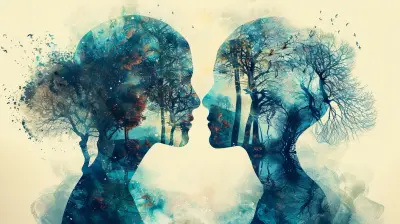Psychoanalysis and the Body: How Physical Symptoms Reflect the Unconscious
4 April 2025
Have you ever noticed how stress can give you a headache, or how anxiety can make your stomach churn? It’s almost as if your body has a secret language, whispering the things your mind refuses to acknowledge. This connection between the body and the unconscious mind is at the heart of psychoanalysis.
Sigmund Freud, the father of psychoanalysis, believed that buried emotions and unresolved conflicts don’t just disappear—they find other ways to express themselves. And often, they do so through physical symptoms. But how does this work? Why does the mind use the body as an outlet for what it can’t process consciously?
Let's dive into the fascinating relationship between psychoanalysis and the body, and how physical symptoms might just be telling you something deeper about your inner world. 
The Mind-Body Connection: More Than Just a Metaphor
We've all heard phrases like "carrying the weight of the world on your shoulders" or "that situation was a real gut punch." But have you ever stopped to think about how literally true these statements can be?Psychoanalysis views the body not just as a physical entity but as a canvas where the unconscious paints its unspoken truths. When emotions remain unresolved, the body often takes the hit—leading to symptoms like chronic pain, tension, fatigue, or even more severe medical issues.
How Does This Happen?
Think of the mind like a pressure cooker. When emotions—anger, fear, guilt—are suppressed for too long, they don’t just vanish. Instead, they get stored in the body, manifesting as migraines, digestive issues, muscle stiffness, or even unexplained illnesses.Freud referred to this as conversion, where emotional distress is "converted" into physical symptoms. While this might sound a bit old-school, modern psychology continues to explore how trauma and repressed emotions contribute to conditions like fibromyalgia, irritable bowel syndrome (IBS), and even autoimmune diseases. 
Common Physical Symptoms with Psychological Roots
Not all ailments stem from the unconscious, but when doctors can’t find a clear physical cause for an issue, psychology often holds the key. Here are some of the most common bodily expressions of emotional distress:1. Chronic Pain and Tension
Ever heard of someone having a pain in the neck over a stressful situation? It turns out, that tension in the shoulders, back, or jaw can often be linked to unresolved emotions. Stress and trauma cause the body to remain in a state of heightened alertness, leading to muscle contractions that don’t fully release.2. Gastrointestinal Problems
Your gut is sometimes called the "second brain" for a reason. Anxiety, fear, and unprocessed emotions can disrupt digestion, leading to symptoms like nausea, bloating, constipation, diarrhea, or stomach cramps. Conditions like IBS are often worsened by emotional turmoil.3. Headaches and Migraines
Tension headaches and migraines can often be the body's response to overwhelm. If you're constantly overthinking, bottling up emotions, or carrying unresolved conflicts, your head might be the first place that signals distress.4. Fatigue and Chronic Illness
Sometimes, exhaustion isn’t just about poor sleep. Chronic fatigue can be the body’s way of shutting down when emotions become too much to handle. Depression and repressed trauma are frequently linked to persistent tiredness and conditions like chronic fatigue syndrome (CFS).5. Skin Conditions
Stress and repressed emotions can often show up on your skin. Conditions like eczema, psoriasis, or acne can worsen when you’re dealing with emotional turmoil. The body, in its own way, tries to purge or express what the mind keeps hidden.
Why Does the Mind Use the Body to Speak?
If our emotions are buried in the unconscious, why doesn’t the mind just bring them to the surface instead of causing physical distress? The answer lies in defense mechanisms—ways our psyche tries to protect us from painful or overwhelming emotions.One of Freud’s most famous ideas is repression—the tendency to push distressing thoughts into the unconscious. But repression doesn’t mean those thoughts disappear. Instead, they linger beneath the surface and emerge in unexpected ways, like through physical symptoms.
For example:
- Someone who suppresses anger might struggle with high blood pressure or chronic migraines.
- A person avoiding grief may experience unexplained fatigue or chest tightness.
- Someone repressing trauma might develop chronic pain or autoimmune issues.
The body, in its own cryptic way, forces us to pay attention until we address what’s lurking beneath the surface. 
Can Psychoanalysis Help?
Absolutely. Psychoanalytic therapy helps bring unconscious conflicts to light, allowing individuals to process emotions instead of storing them in their bodies. When deeply buried emotions are acknowledged and dealt with, physical symptoms can sometimes improve or even disappear.How Does This Work in Therapy?
Psychoanalysts use techniques like:- Free Association: Speaking freely about thoughts and feelings to uncover hidden emotions.
- Dream Analysis: Interpreting dreams to reveal unconscious conflicts.
- Body Awareness Work: Connecting physical symptoms to emotional states.
- Talking Through Past Trauma: Revisiting repressed memories to release stored emotions.
By working through these suppressed emotions, people often experience both psychological and physical relief.
Simple Ways to Start Listening to Your Body
Even if you’re not in therapy, you can start tuning in to what your body might be telling you. Here are a few ways to bridge the mind-body gap:1. Pay Attention to Recurring Symptoms
If the same physical symptom keeps coming back, ask yourself: What was I feeling or experiencing when this started?2. Journal Your Physical Reactions
Start jotting down when headaches, stomach pains, or tension flare up. You might notice patterns connected to stressors in your life.3. Practice Mindfulness and Body Scanning
Mindfulness helps tune into bodily sensations. Try a body scan meditation—mentally checking in with each part of your body and noticing tension or discomfort.4. Express Your Emotions
Suppressing emotions doesn't make them disappear—it just buries them deeper. Talking, crying, laughing, or even screaming into a pillow can be therapeutic.5. Move Your Body
Psychologists often say, "The body keeps the score." Physical movement like yoga, walking, or dancing can help release stored tension and emotions.Final Thoughts
Your body and mind aren't separate—they're in constant conversation. When your unconscious mind struggles with emotions too painful to face directly, your body steps in to deliver the message. Physical symptoms aren’t just random—they can be clues leading you to deeper self-awareness and healing.So, the next time you have an ache, pain, or persistent physical symptom, don’t just ignore it. Take a moment to ask yourself: What is my body trying to tell me? You might be surprised at the answers you uncover.
all images in this post were generated using AI tools
Category:
PsychoanalysisAuthor:

Janet Conrad
Discussion
rate this article
4 comments
Katherine Wilson
Who knew my back pain was just my subconscious saying, 'Stop scrolling and start living'? Guess I’ll swap therapy sessions for some yoga—and maybe a donut. Balance, right?
May 9, 2025 at 2:32 AM

Janet Conrad
It's interesting how our bodies can reflect our mental states! Yoga can be a great way to connect mind and body, and a little indulgence now and then is all about finding that balance.
Colton Frank
This article insightfully highlights the complex link between our minds and bodies.
April 16, 2025 at 4:48 PM

Janet Conrad
Thank you! I’m glad you found the connection between mind and body in the article insightful.
Cassandra Wagner
What a fascinating exploration of the mind-body connection! It's amazing how our physical symptoms can reveal hidden emotions. This article inspires a deeper understanding of ourselves—thank you for sharing!
April 15, 2025 at 4:03 PM

Janet Conrad
Thank you for your thoughtful comment! I'm glad you found the exploration enlightening. Understanding the mind-body connection is indeed powerful for self-discovery.
Arlo McCoy
Ever wonder if your knee pain is just your psyche throwing a tantrum? Maybe your body is just trying to whisper secrets about your dreams! Let’s tune in to those quirky conversations between mind and muscle!
April 15, 2025 at 3:07 AM

Janet Conrad
Absolutely! Our physical symptoms often hold deeper meanings, reflecting our unconscious emotions and thoughts. It's fascinating how the body speaks to us in unique ways.



